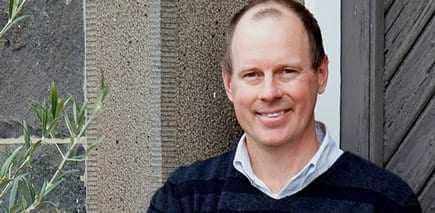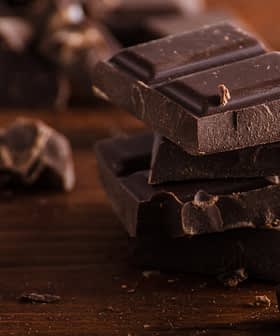
“Growing an olive tree is easy, but making it fruit consistently is very difficult and that’s been to our advantage.”
This is how Rob McGavin, Co-Founder and Executive Chairman of Australian olive company Boundary Bend, and its famous extra virgin olive oil brand Cobram Estate, describes just how difficult it is to get a thriving olive oil business up and running. But this is exactly what he has done, transforming the company into Australia’s largest vertically integrated olive oil company in just over 10 years.
Mr. McGavin, brought up on a sheep and cattle farm in western Queensland, got his “financial start” in the wine business. He was on a rugby tour in Ireland when he noticed the buzz about Australian wine and started to think about what he could do that might be different. “At that time the market was still reasonably depressed, it hadn’t boomed, but you could say it was on the way up,” he said.
And so he enrolled in an Agribusiness Administration course at Markers Oldham College in Geelong, Victoria in 1992 at the age of 23 before going on to buy a small 35-acre vineyard in South Australia. Over the next seven years he built that small piece of land into a vineyard of more than 600 acres, selling 80% of the company in 2003.
It was during this time that he teamed up with a college friend, Paul Riordan, who was looking into the olive industry. Mr. McGavin says at the time the Australian Government was doing a lot of work in olive oil and, after investing heavily in vineyards, he was looking to do something else. The loss of both parents to cancer also inspired him to look beyond money making and into promoting healthier eating, such as extra virgin olive oil.
“I had a lot of experience developing a horticultural business and Paul hadn’t but he’d done a lot more work on the industry and what varieties we should plant to get it off to a good start,” he said. “As far as where to plant and sites and where to develop them, I suppose that was my area of expertise.”
He said from then it took a number of years before the first soil was turned. Mr. Riordan traveled overseas and spent some months with the world’s leading olive oil experts in Israel, Italy, Greece and Spain, and chose five varieties that would be their major producing varieties. These were imported to their nursery in Australia from the mother trees in Israel, because they were worried those grown in Australia might not be true to type or genetically correct.
“We decided quite early on that we needed 1000 hectares (2471 acres) of olives if we wanted to give ourselves a good chance of success,” he said. “That was reasonably ambitious at the time. There were no groves in Australia that were anywhere near that size. “So it came with a lot of risks that we probably weren’t fully aware of at the time. But when you’re young and ambitious you always look to the positives and think you’ll be able to manage the negatives. Which we have but it’s been pretty hard work.”
The pair finally decided to plant 200 hectares (about 500 acres) in the first year, which was going to take about AU$7 million (US$6.78 million), of which they had nowhere near. So in good old country style, they got family and friends together to invest in the first grove which was planted in late 1999 at Boundary Bend in northern Victoria. They did the same thing in 2000 and again in 2001 until they had 500 hectares planted. “We hadn’t achieved our goal of 1000 hectares but we got a pretty good start and then we thought we better concentrate on making sure it worked,” he said.
The business hit the ground running when Argentinean olive oil expert Leandro Ravetti joined the company as Executive and Technical Director in 2001. By 2004, the company was producing 25% of Australia’s production in olive oil but with just 2.5% of Australia’s planted area. “So we were really doing well. There had been lots of people that planted groves that just were not performing at all,” Mr. McGavin said.
Timbercorp, a large Australian olive, almond and blue gum company with 2770 hectares of olive groves, was one of these. So in late 2004 it engaged Boundary Bend, which from the same age tree was producing seven times what Timbercorp was generating, to manage its grove. As Boundary Bend was doing so well with its groves, Timbercorp decided to keep planting olives, and increased its total area including loan groves up to 6500 hectares (16,000 acres).
Then last year Timbercorp was forced into liquidation, along with numerous other companies that went down during the global financial crisis. “We were fortunate enough to be able to buy all its olive groves from the liquidator,” Mr. McGavin said. “We owned the processing plant, the harvesters. It was just too risky for anyone else.” He said this was a fundamental change in Boundary Bend’s business putting it in a very good position in the market.
“But jeez we’ve had some difficulties,” he said. “It is just tough. And I would say 95% of people who go out and plant an olive grove – even if they’re in the industry – really struggle, because it is very, very difficult to make them consistently produce – to get your pollination right, nutrition, water, processing, logistics right – so that you’ve got an excellent quality EVOO out the other side at a competitive price.” This is a constant struggle for the industry, with the price of EVOO just “terrible”.
“I would say it’s below cost production for almost everyone in the world,” he said. “This means that this is a pretty exciting industry going forward because I’ve been in agriculture long enough to know that when the price is down for long enough no one plants and no one invests in plantations, which hasn’t really been happening in any way for the last 10 years, so there’s no new supply coming in, but there’s sustained worldwide growth in demand for EVOO. So when it turns, when there’s not enough extra virgin around, by the time someone thinks about planting it’s five years until they’ve got any sort of production, when China’s compounding 60% growth per year as well as India and other places.”
Another one of the struggles that the Australian olive industry has had to face is severe drought. “I would say that one of the main reasons Timbercorp went into liquidation was the drought,” Mr. McGavin said. “It cost them tens of millions of dollars in leasing extra water.” The south of Australia is now crossing its fingers and waving goodbye to the drought, with the Murray-Darling Basin storages above 66% and the Hume dams at 77% full and filling fast, levels it hasn’t seen in 10 years.
As far as the Australian olive oil industry’s position worldwide, Mr. McGavin says it is still very small. But he says it is in a great position to grow, with a number of changes signaled. “As far as where we stand, we’re a low cost producer of very high quality olive oil with a really good opportunity to grow. But for someone to make the investment the price needs to go up in olive oil because you just couldn’t justify planting a great big olive grove at these current prices.
“I would expect a very sustained increase in price for EVOO worldwide, because I know that it’s the only oil product that’s healthy and unadulterated and natural, and that’s what consumers want. I think Australia is pretty well positioned, because we are the only country that has developed a model for modern olive growing. We’re getting 10 times the yield of the world average so we can continue to expand here but we can also continue to roll our model out to places like Argentina. Argentina is obviously a lot bigger producer than us but its quality is of a lower standard because they handpick so much.” (Boundary Bend owns 1,500 hectares (3,700 acres) of “freehold land, highly suitable for olive development, with significant reserves of water in the province of San Juan, Argentina” according to its website.)
“I think Australia is pivotal to the future of the olive industry. There are going to be some pretty major advances in the Southern hemisphere in the next 10 years as far as our position in the world market,” says McGavin.
He says there is also the worldwide issue of olive oil standards and adulterated oils, with a large portion of EVOO consumed worldwide sold as EVOO but actually containing seed oils and refined oil. “So as countries such as Australia and the US enforce labeling there’s going to be a big gap between EVOO and the rest because the consumers are there for it and the supply will not be there,” he said.
Mr. McGavin says Australian consumers are the “luckiest and most spoilt consumers in the world” in terms of the quality of oil they can buy in the supermarket versus the price. An example of this is its “everyday supermarket brand” Cobram Estate Fresh and Fruity, which last month was announced as the Gold and Champion Commercial EVOO winner in the prestigious Sydney Royal Fine Food Show. “How many gold medal olive oils are not expensive that you can buy in the supermarket?” he says. “The consumers here don’t realize it but I know we’re onto something.”
Mr. McGavin says this is largely due to its production methodology, the fact that it’s been able to mechanically harvest, and the way it’s piggy-backed off the wine industry for cleanliness and timeliness. “This means that our cost of production isn’t a lot more but our quality is absolutely brilliant and right up there in the top 2% of quality of anywhere in the world but it isn’t just a few liters, it’s our whole production,” he says. That production this year amounted to 36,400 tonnes of olives and approximately 6.5 million litres of olive oil.
Mr. McGavin’s passion for the industry is matched only by his spirit. At just 41, he has achieved what many could only dream of. He contributes this to determination, working hard and working smart. “And it is honesty and integrity and being down to earth,” he said. “If you haven’t got that through your business, and you don’t practice that, you might be lucky and be successful but it won’t last.”
But he says the most important thing is having a long-term view. “Don’t worry about tomorrow, worry about 3 to 5 to 20 years,” he said. “Always something goes wrong. The price goes against you, the currency goes against you, but if you average over the long term, it’ll be fine. If you’re forced to sell in bad times that’s when there’s trouble.”
Mr. McGavin said Cobram Estate’s success lies in its careful approach to every aspect of the business. “The saying in our business is that ‘you don’t add on another business unit unless you’re going to continue running your existing business as well as or better than you were before’, so we’ve got just the greatest team of people in every aspect of the business. And I think if you’ve got really good people and you’ve got a really good culture in your business it goes a long way to success.”
With more gold medals and business awards under their belt than you could poke a stick at, their methods are obviously working.








